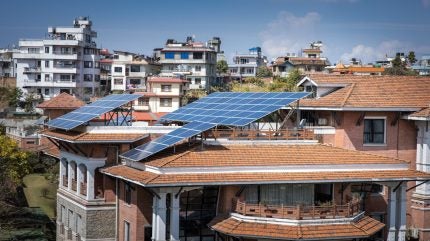
The International Centre for Integrated Mountain Development (ICIMOD) has released a comprehensive assessment report revealing that the Hindu Kush Himalaya (HKH) region harbours a significant but underutilised renewable energy potential, particularly in hydropower.
The study, titled ‘Together we have more power: status, challenges, and the potential for regional renewable energy cooperation in the Hindu Kush Himalaya’, examines the current energy sources, renewable energy share, and the potential for regional cooperation.

Discover B2B Marketing That Performs
Combine business intelligence and editorial excellence to reach engaged professionals across 36 leading media platforms.
The report indicates that clean energy constitutes only 6.1% of the total primary energy supply in the HKH countries, despite the region’s renewables potential of more than 3.5TW.
It notes that of the 882GW of identified hydropower potential across eight HKH countries, including Afghanistan, Bhutan, Bangladesh, China, India, Myanmar, Nepal, Pakistan, 635GW comes from the region’s transboundary rivers.
The report highlighted that only 49% of this potential is currently being tapped.
While Bhutan and Nepal meet all their electricity needs with renewables, other countries in the region rely heavily on fossil fuels.

US Tariffs are shifting - will you react or anticipate?
Don’t let policy changes catch you off guard. Stay proactive with real-time data and expert analysis.
By GlobalDataCoordinating lead author Avishek Malla said: “We have extraordinary renewables potential within our region, as well as in India and China, two of the world’s pioneers in clean energy.”
The report also points out the alarmingly high reliance on biofuels and waste in four HKH countries, reflecting the continued use of traditional materials for cooking and heating, which has repercussions on air quality and human health.
The ICIMOD report identifies several barriers to renewable energy progress in the HKH region, including high capital costs, limited public finance, and challenges in attracting private investment.
It also highlights the need for new policy and regulatory frameworks to address issues such as air and water pollution.
The report concludes by emphasising the benefits of regional energy cooperation, which could include renewable energy trade, disaster risk reduction, and enhanced agricultural productivity, among others.
Such cooperation could also facilitate the transfer of renewable energy technologies and knowledge, fostering green growth and job creation, and supporting countries in achieving their national and global commitments.
Malla added: “It is crucial that we think beyond trade for us to truly seize the opportunity of renewables holds for our region, however: we need investment in infrastructure, and a massive uptick in south-south skills and technology exchange, leveraging existing platforms including the South Asian Association for Regional Cooperation’s Energy Centre and the Bay of Bengal Initiative for Multi-Sectoral Technical and Economic Cooperation energy ministers conference.”



